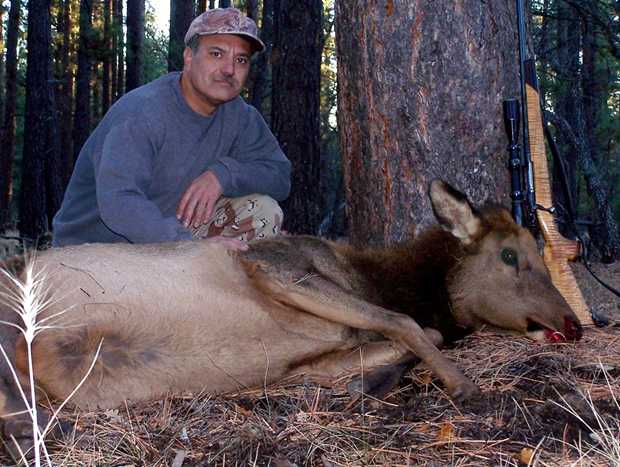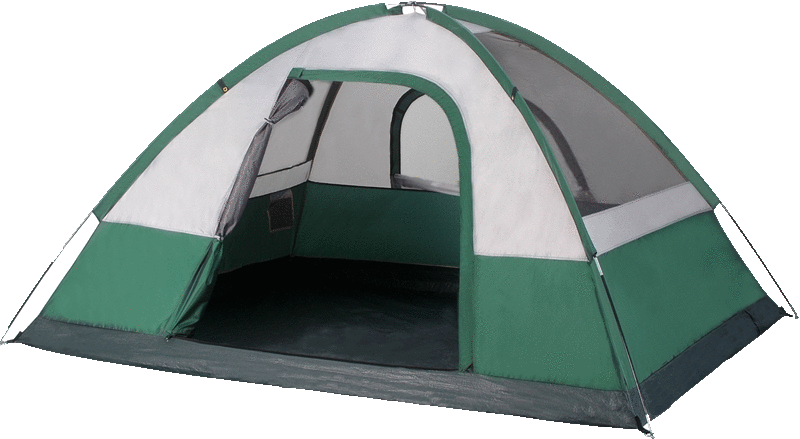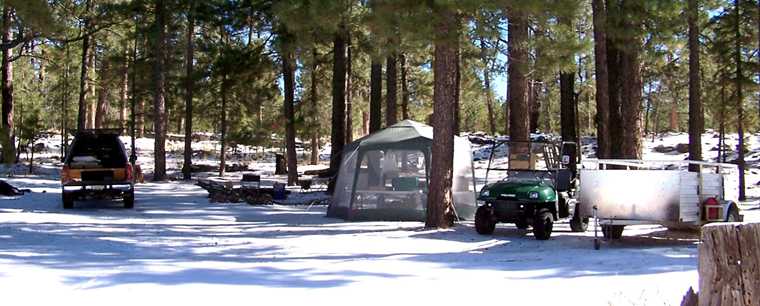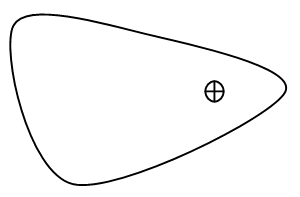The weather report for the start of my solo December cow elk hunt was not good news.
A significant storm was forecast to begin overnight before opening day and last most
of the weekend. I don’t have a nice cozy toy hauler trailer, 5th wheel, or motor home.
All I’ve got is a pickup truck with a camper shell for my sleeping accomodations. For
my kitchen, I set up a screen house with tables and chairs inside. So my choices came
down to getting up there, making camp and freezing my butt off while waiting for the
storm to pass, or staying home until the storm ran its course. I chose option 2.
The storm was scheduled to be outta here by noon Sunday, so I left home on Sunday
morning. I was planning to make camp where I did the year before with Mark Snyder and
his troop during the youth elk hunt. We had plenty of elk action on that hunt.
As I passed the 7000 foot level, the ground began to be covered in snow. When I
reached the camp spot, the snow was pretty much everywhere. “OK, I’ve snow-camped
before, I can handle this,” says me to myself.
I unloaded the Polaris Ranger, disconnected and parked the trailer, set up my screen
house, my tables, my chairs, dug out the fire pit, got camp all set up and situated.
It was approaching 1 PM by the time I was done.
The skies had cleared nicely. Temperatures were in the mid to high 40’s. While
finishing lunch, I decided that my next course of action would be to explore the back
country in the Ranger. I wanted to go check out the area where Sam shot his elk last
year.
After finishing lunch, I saddled up the buggy and went for a tour. I wasn’t really
quite yet into full hunt mode. Knowing how the elk prefer to get up and around early
and late in the day, I didn’t really expect to see any critters.
The snow was fairly firm at camp, but what I found on my buggy-run was quite different.
With the sun shining, much of the snow was already melting. The road I was on was
turning into a snow-melt stream. What wasn’t clear liquid was slushy, and under the
slush was mud.
After traveling about two miles in this stuff, I turned around, well short of Sam’s
elk kill site. I never really felt that I was in danger of getting the Ranger stuck,
but the potential was definitely there.
I wasn’t sure what I was going to do as I made my way back to camp, but by the time I
arrived, I had made up my mind that, “I can’t hunt in this stuff.” In the next couple
of days, the good weather would only make the slushy conditions worse.
It was mid-afternoon now, the day was getting on. I wanted to find a new camp spot
under the 7000-foot snow line. But where?
In somewhat of a frenzy, I packed camp up faster than I ever thought possible. Before
I knew it, my rig was running back down the main highway toward snow-free forest. As I
left the pavement to turn back onto a major forest dirt road, I grew frustrated and
discouraged. There were a great many hunt camps scattered along the road.
My frustration started to relieve somewhat after about two or three miles in, as the
camps started getting sparser as I got further away from the pavement. I was still on
a pretty major road though. I usually camp at least one or two turns off the major
forest arteries for some peace and quiet. Time was a-wasting though, so I found an
empty camp spot right off the road and pulled-in.
In another 30 to 45 minutes, I had the screen house set back up in my new spot and I
was ready to head off on another exploratory mission in the huntin’ buggy. It was
probably around 3:30 in the afternoon at this point.
I needed to see what other camps might be nearby, and where I might get in some decent
hunting away from the crowds. After circulating the good roads near camp and thankfully
not finding an abundance of other camps, I turned off onto a rather rough road to see
what kind of country this led to.
Though there was no snow in this area, there was a little bit of mud. The country was
generally rocky enough that the mud wasn’t a big problem. I ran this rough road for
about two miles until I popped out at another good road. OK. So now I know where this
goes. I turned around and headed back the way I came.
It was getting to be that time of day, where I might reasonably expect the critters to
be stirring, so at about the half-way point, I decided that it was time to park and
actually do a little hunting!
I walked south from the road about a quarter-mile into a semi-open flat area. Soon I
crossed an elk trail. It looked like the prints in it were fresh so I followed it for
about another quarter-mile until it crossed a road.
I followed the elk trail a little ways past this road, but soon lost my motivation. I
guess I still wasn’t really in a hunt-focused frame of mind with all the administrative
duties that the day had been filled with. So I turned around and started heading back
toward the Polaris.
About half-way back, I started noticing, … how should I put this? — ahem, a heavy
sensation near my backside. So I found a nearby tree to lean my rifle against with a
branch stump on which I could hang my pack.
I stepped around a large downed tree branch and “dropped-trou.” Things were going well,
when I noticed movement through the trees about 100 yards away in the direction I was
facing.
“Oh sh . . !” in more ways than one!
Now I usually tell myself to never let my rifle get out of arms reach, but there it was,
on the other side of that large downed tree branch! I quickly finished up my activities,
and buttoned up. At that point I caught my second flash of movement. They were
definitely heading towards me!
I stepped over to grab my rifle. I got back down into a kneeling position and as I did
so, caught a third glimpse of the elk. They were moving quickly, in a motivated sort of
way. By now I could identify a mature cow in the lead of the group, moving from left to
right. There were still trees in the way, but I identified a clearing out in front of
her. I positioned the crosshair of the scope at the left side of the clearing, then
swung it with her as she entered.
This was a lot like swinging a shotgun. As a matter of fact, I thought that I had
overswung, as I called the shot at a point in the air in front of her, past her chest.
At the report, she turned 180° and started running in the opposite direction. I quickly
jacked in a second round, looking for the opportunity to make a second shot. It wasn’t
needed.
About 20 yards after reversing her path, she reared up a little, then crashed to the forest
floor. Wow. It all happened so fast, and before even spending one night at camp!
OK, a short interlude to discuss hardware — I was hunting with
“Dad’s Springfield,” which I wrote
about in December of 2004. It’s a sporterized 1903 Springfield rifle in .30-06. It’s
wrapped in a gorgeous tiger-striped maple stock and it wears a Lyman All-American 6x
“Perma-Center” scope from the era in which the rifle was built.
Since taking up handloading, I don’t shoot much factory rifle ammo any more, but this
hunt was an exception. Before my boys’ Kaibab doe hunt in October of 2004, we received
four boxes of lead-free ammo free of charge from the Game and Fish Department. It’s all
about saving the condors from lead poisoning. Since they didn’t offer ammo in .243 Win.
or .260 Rem., which the boys were hunting with, I handloaded lead-free ammo for that hunt.
But a free ammo opportunity is not to be dismissed lightly. I instructed the boys to
request two boxes each of the Federal Vital-Shok Premium .30-06 ammo loaded with the 180
grain Barnes Triple-Shock X-Bullet. This is the ammo I used on the elk hunt.
When I reached the cow, she was gasping her last breaths. I had only about 30 minutes
of light left in the day.
I knew that I couldn’t finish the red work in the remaining light. So I tagged her, took
a GPS position and hiked the last quarter mile to the Ranger. There was no clear path
from the Ranger to the cow, but the terrain was mostly flat. With just a little dodging,
bobbing, and weaving, I was able to park the Ranger with the front end pointing at the
cow. Not long after starting, I did lose all natural light, at which point I fired up
the Polaris and turned on full illumination.
While performing the necessary surgical operations, I had the opportunity to perform a
forensic exam. If you consider that the chest cavity of an elk is shaped about like
this:
… the hit was about where the little crosshair symbol is shown. So yeah, the hit was
well forward, but quite deadly. It did go squarely through both lungs near the point
where everything comes together before entering the neck area. Still fresh on my mind
was Sam’s hit about a month earlier on his first buck. I definitely did not want my
shot to hit too far back!
This was my second elk. Since my first in 2003, I had refined my Ranger elk recovery
method. The technique uses the capability of the Ranger’s bed to tilt down in back.
By fixing a pulley system to the roll cage, and tying the pulling end of the line off
to a tree, the elk can be pulled up into the bed of the Ranger by slowly driving forward.
The first time I did this, my pulley was too wimpy – I broke the line several times
before I was successful. Plus, getting the elk far enough up and in so that the bed
could be tilted flat was very difficult because I rigged the system to pull the elk up
from the feet.
This time I had a stronger pulley using stronger line, and I rigged it to pull the elk
up into the Ranger, back first. Everything went smoothly and soon I was triumphantly
motoring back to camp with the elk securely stowed in the Ranger’s bed.


![]()





